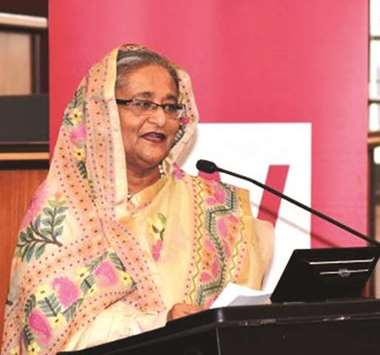Bangladesh Prime Minister Sheikh Hasina has sought technical assistance for development of country’s marine aquaculture and exchange of teachers on oceanography.
Noting that Bangladesh needs greater human capacity as it is moving to the next stage of development through graduation from the least developed country (LDC), Prime Minister Hasina yesterday sought Australian co-operation to this end.
“As Bangladesh is going to the next stage of development through graduation from LDC, we need greater human capacity where Australia can contribute by providing training-type programmes and vocational education,” she said.
While paying a visit to Western Sydney University, the prime minister also sought Australian co-operation in developing an inclusive and people-centric blue economy.
“Bangladesh is planning to develop inclusive and people-centric blue economy enhancing capacity-building with innovative financing, ensuring transfer of critical technology, and strengthening cross-sectoral partnerships and collaboration from Australia,” she said.
She urged Bangladeshi students studying at the university to take advantage of the best knowledge that this university can offer.
The prime minister said she was deeply touched at the establishment of a bust of Father of the Nation Bangabandhu Sheikh Mujibur Rahman on the university campus. “The bust is rightly located in front of the Institute of Ocean Governance (ICOG) to recognize Bangabandhu’s vision and pioneering role on maritime boundary demarcation through an Act of Parliament in 1974.”
She mentioned that Bangladesh has been enjoying warm relations with Australia since Australia’s recognition to independent Bangladesh on January 31, 1972. “Very fundamental of bilateral relations between Bangladesh and Australia originates from the fact that Australia was the first country from the developed world to recognise our independence,” she said.
The prime minister recalled that after the declaration of independence by the Father of the Nation on March 26, 1971, he called upon the people of Bangladesh to fight for
independence.
“We offer homage to the world leaders who stood by our side during our Liberation War and the early years of our nationhood. Edward Gough Whitlam was one of the world leaders who championed our cause for liberation. Whitlam played a leading role in building a bipartisan consensus about Bangladesh as the leader of the opposition in the Australian Federal Parliament in 1971,” she said.
Hasina mentioned that Whitlam also raised the plight of the humanitarian sufferings at the hands of the Pakistani occupation forces and their local collaborators at that time.
He played an important role in lobbying with the international community for Bangladesh to be recognized by the Commonwealth and other countries, she said.
“Edward Whitlam visited Bangladesh on January19, 1975. It was the first and last visit by a prime minister of Australia to Bangladesh,” the prime minister recalled.
She also recalled with gratitude the contribution of Australian national William AS Ouderland during the War of Liberation for which he was given gallantry award ‘Bir Protik’ and awarded with ‘Friends of Bangladesh War of Liberation War 1971’.
The prime minister said Australia has been a favourite destination for higher studies for Bangladeshi students and currently, some 200 students are studying in Western Sydney University.
“Western Sydney University’s present collaboration with Bangladesh is strengthening capacity of our judiciary management and providing training programme for department of oceanography, University of Dhaka and Bangabandhu Sheikh Mujibur Rahman Maritime University to enhance their knowledge and skills in ocean
governance,” she said.

Bangladesh Prime Minister Sheikh Hasina speaking at an event at Western Sydney University Australia.
